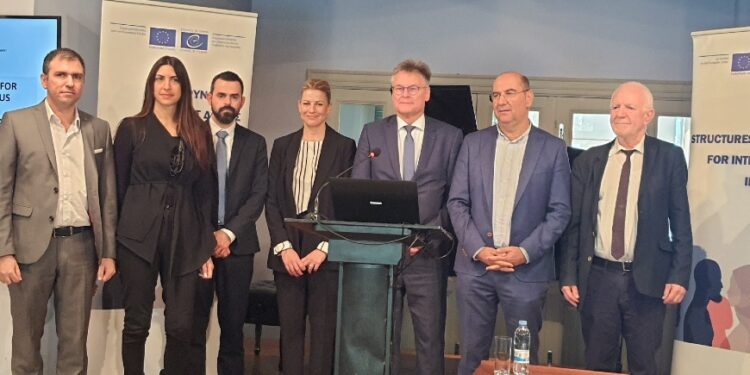Representatives of the Council of Europe, European Commission, Deputy Ministry for Migration and International Protection, Mayor of Larnaca and Mayor of Atheniou
The results of the joint project “Enhancing Structures and Policies for Intercultural Integration in Cyprus” were presented at a closing event in Nicosia on 6 December 2024. This project, a collaboration between the Council of Europe’s Intercultural Inclusion Unit, the European Commission’s Directorate General for Structural Reform Support, and the Migration Department of the Deputy Ministry for Migration and International Protection, marks a milestone in Cyprus’s ongoing efforts to promote intercultural inclusion.
The conference was opened with welcoming remarks by Lampros Kaoullas, on behalf of Dr. Nicholas Ioannides, Deputy Minister for Migration and International Protection, followed by speeches from Thorsten Afflerbach of the Council of Europe, Judit Rózsa of the European Commission (via video), and Andreas Vyras, President of the Union of Cyprus Municipalities and Mayor of Larnaca.
The 14-month project was designed to address some of the key challenges in migrant integration, focusing on fostering trust, building community cohesion, and leveraging diversity as a benefit to society. Following a previous two-year project “Building structures for intercultural integration in Cyprus”, this phase aimed at strengthening earlier achievements and implementing innovative tools developed under the Council of Europe’s Intercultural Cities Programme and Committee of Experts on Intercultural Inclusion (ADI-INT).
The Council of Europe’s unique approach integrates local, regional and national levels, as well as civil society, to manage diversity effectively and promote shared values based on human rights.
Some of the key achievements and results which were presented by the Senior Project Officer, Nichola Howson, included:
Support for the Regional Intercultural Networks: Five networks covering the Nicosia, Larnaca, Limassol, Paphos, and Famagusta districts were supported to implement activities from their intercultural action plans and strategies. The network coordinators also participated in peer exchanges with counterparts in Italy, Portugal, and Spain, providing inspiration and strategies for sustainable network growth.
Capacity building: Training sessions were organised for representatives of national bodies, fostering intercultural competences. A tailored intercultural competencies course in Greek was also developed. The capacity-building sessions reached 81 participants, achieving high satisfaction and relevance for daily work ratings.
Research initiatives: A study on social cohesion in Cyprus provided insights into societal integration dynamics, regardless of nationality or residency. Additionally, the Intercultural Cities Index was used to monitor integration efforts at the district level, the analytical results will be published in early 2025.
Policy recommendations: By promoting multilevel and multistakeholder governance and dialogue, the project demonstrated the importance of cooperation between governmental levels and civil society for effective integration. This approach aligns with the Council of Europe’s recommendation to treat diversity as an asset for societal growth and wealth.
Experts Despoina Cochliou and Natasa Charalambous presented research findings, while regional coordinators shared success stories from their intercultural networks.
As the project concludes, stakeholders expressed hope for the initiative’s legacy to inspire the drafting of a future national integration strategy including a multilevel and multistakeholder platform for integration to ensure the necessary coordination to foster a more inclusive society.
Publications from the project, including evaluations of network activities and recommendations for sustainability, will be available to guide future efforts. The project laid a robust foundation for future actions, including providing tools such as the social cohesion survey, tailored intercultural competence training for public officials, and regional intercultural networks.
The “Enhancing structures and policies for intercultural integration in Cyprus” project is co-funded by the European Union via the Technical Support Instrument, and implemented by the Council of Europe, in cooperation with the European Commission. The views expressed herein can in no way be taken to reflect the official opinion of the European Union.
For more details about the project and its outcomes, visit the project page.
Source link : http://www.bing.com/news/apiclick.aspx?ref=FexRss&aid=&tid=6755906f18d34401a60610270aebec38&url=https%3A%2F%2Fwww.coe.int%2Feu%2Fweb%2Finterculturalcities%2F-%2Fclosing-event-of-the-intercultural-integration-in-cyprus-joint-project&c=5306912414528996261&mkt=de-de
Author :
Publish date : 2024-12-06 06:29:00
Copyright for syndicated content belongs to the linked Source.



